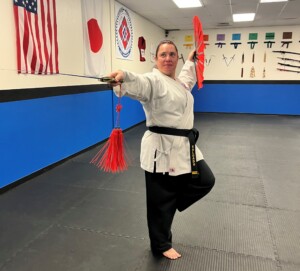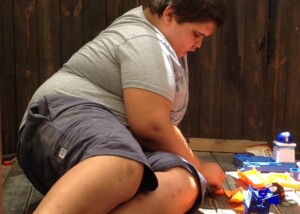If a puppy can be trained to sit still while tennis balls bounce past it, why can’t autistic kids learn NOT to have meltdowns?
Or CAN they if they’re “high functioning”?
- I have a clinical diagnosis of ASD-1, received in 2022.
- This article pertains mostly to children, teens and adults with “high functioning” or autism with low support needs, also known as mild autism and what was previously called Asperger’s syndrome.
Online content about meltdowns in autistic kids centers on how to manage these events, not what parenting style actually prevents them in the first place.
But based on common sense and logical thinking, it enormously seems that lenient parenting would be heavily associated with frequent, grandiose meltdowns.
Let’s put it this way: If during my childhood, the only consequence of hurling a lamp into the wall was to be sent to my room, I would’ve thrown quite a few lamps.
And by the way, I really did one day view footage of tennis balls being bounced past golden retriever puppies in training to service disabled individuals. The pups remained still and quiet throughout.
Can a strict upbringing with authoritarian parents prevent meltdowns in autistic children?
“I was raised in an incredibly strict household,” begins Lena Salgado, 44, diagnosed with Autism Spectrum Disorder at 37.
Lena reports that she has never had a meltdown – or a shutdown, for that matter.
I had a strong hunch that Lena had been raised in a strict household – where proper behavior was rigidly enforced, where “bratty” behavior, or showing disrespect to or yelling at her parents, was not tolerated under any circumstances.
My hunch was dead-on accurate.
“I’m one of four kids, a twin, and I’m the youngest; my older sister is 10 months older, and my brother is 10 months older than her,” continues Lena, who began karate lessons in her late 30s, has a black belt and co-owns Martial Science Academy in Aurora, CO.
“Three of us were born in the same calendar year. My mother didn’t allow any talking back, tantrums or even simply disagreeing with her.”
You might be thinking that not being allowed to simply disagree with one’s parent is taking strictness and rules abominably too far – assuming that the disagreement doesn’t come with cussing, yelling or door slamming.
And I agree: It’s authority gone way overboard. However, this unreasonable rule is indicative of how much a child’s behavior – autistic or neurotypical – can be molded.
Lena continues, “Later I realized how abusive my upbringing was, but getting upset was unacceptable.
“I learned to deal with any issues in my own way, internally to avoid any scrutiny or punishment.
“The skills I built then really helped later in both the military and civilian life.
“Now, I’m very glad to have gotten so good at regulating my emotions because I lead a full and active life.”
It would be a mistake to conclude that the only way to prevent autistic meltdowns is to inflict physical harm.
However, Lena’s case clearly illustrates that a predisposition towards meltdowns can be kept dormant through learned coping strategies that the child knows would not anger their parents.
“I used to count,” she says. “I still sometimes do, to help if I’m bored or doing something that seems to take forever and I need it to be manageable.
“When I ran a half-marathon, I would just count steps, not to keep track of how many, but to set a rhythm and just keep going.
“When I was a kid, if I was upset, I would count how long it took to drive from one freeway sign to another, how many steps around the block, or how many times I stirred something while making dinner.
“Reading was also a great escape. I can so easily slip into other places and times when I read.
“It helps me relax before bed and let all the crazy thoughts just dissipate.
“For a couple years I would just read the dictionary. The lists of words and definitions were so soothing and fantastic.
“Just facts, nothing to interpret or analyze, or read into or feel. I would study the atlas too.”
We can certainly, based on logic and common sense, extrapolate from Lena’s experiences that autistic children are just as influenced by what their parents permit and do not permit, as are NT children.
I myself grew up in a strict Catholic household, where my mother believed that “children should be seen and not heard.”
I’ve had only two meltdowns: one during preschool, triggered by the sound of a wood chipper; and one at around age six, triggered by a fireworks show.
One might say that my parents were too strict, but then again, none of their six kids ever had meltdowns – at least not to my parents’ or my knowledge.
We all just knew that we’d BETTER NOT fly off the handle.
It was an instinctive knowledge when we were very young, that “acting up” or getting out of hand was a forbidden behavior – absolutely forbidden.
Is it possible, though, that Lena and I have a form of autism that doesn’t come with meltdowns, regardless of childhood environment?
The autistic people who report never having meltdowns typically mention that they do have shutdowns from time to time.
Like Lena, I’ve never had a shutdown. I can’t believe that our upbringings had nothing to do with the absence of meltdowns and shutdowns. That’s just entirely too coincidental.
Meltdowns in Autism Are Like Runaway Trains
An autistic meltdown is a neurological response to feeling overwhelmed, often of a sensory nature.
Meltdowns in ASD are not done deliberately in the sense that a “tantrum” is: to get one’s way, to get that second ice cream cone, to stay a bit longer at Suzie’s birthday party.
But a child’s brain is highly malleable. The wiring can be altered. Suppression of meltdowns can be “learned” because environment can literally shape a growing brain!
PTSD, sustained from childhood psychological trauma, is a perfect example.
Children’s brains, be they autistic or NT, can be molded such that neurological responses to stimuli can be suppressed – or amplified, as in the case of PTSD.
Bottom line: Think of a child’s brain as wet clay.
I’m having a lot of difficulty imagining that a parent — whose minimal-support-needs autistic child has regular meltdowns, or even occasional ones — is strict, authoritarian and won’t tolerate “disrespect.”
I’m having a very easy time imagining that MSN autistic kids who regularly have meltdowns have lenient parents who also allow their NT children/teens to get away with a lot of infractions, tantrums or disrespectful behavior.
A woman posted on a FB page for autistic adults and parents of autistic children that her body is normally covered in bruises – from getting beaten by her NINE-year-old autistic daughter.
Though the daughter is non-speaking and has significant support needs, I can’t – for the life of me – believe for a second that her mother is even 10% as strict and Alpha as mine was.
As a girl growing up, the idea of hitting my take-charge, Alpha mother was as unthinkable as anything could get. And my father, too, though he was more laid back.
The woman on FB gets routinely assaulted by her young daughter.
If this mom continues on this path, imagine how injurious the beatings will be when the child is 12, let alone 15.
- At the end of the day, humans are creatures who learn behaviors.
- We learn what’s not acceptable, and what is. We learn what we can get away with.
- It’s intriguing and legitimate to suppose that meltdowns of partly a neurological nature can be shaped by their consequences.
Much of human behavior is LEARNED, even in (gasp!) Autistics!
 Renshi Lena Salgado and Renshi Tom Beach own Martial Science Academy in Aurora, CO, with the goal of teaching students of all ages, abilities and goals the physical, emotional and mental benefits of Shito-Ryu Karate. At MSA, they strive to create a safe and nonjudgmental environment. They love teaching and use different approaches depending on each student’s learning style to make Karate accessible to all. Follow on Facebook.
Renshi Lena Salgado and Renshi Tom Beach own Martial Science Academy in Aurora, CO, with the goal of teaching students of all ages, abilities and goals the physical, emotional and mental benefits of Shito-Ryu Karate. At MSA, they strive to create a safe and nonjudgmental environment. They love teaching and use different approaches depending on each student’s learning style to make Karate accessible to all. Follow on Facebook.
 Lorra Garrick has been covering medical and fitness topics for many years, having written thousands of articles for print magazines and websites, including as a ghostwriter. She’s also a former ACE-certified personal trainer. In 2022 she received a diagnosis of Level 1 Autism Spectrum Disorder.
Lorra Garrick has been covering medical and fitness topics for many years, having written thousands of articles for print magazines and websites, including as a ghostwriter. She’s also a former ACE-certified personal trainer. In 2022 she received a diagnosis of Level 1 Autism Spectrum Disorder.
.



























